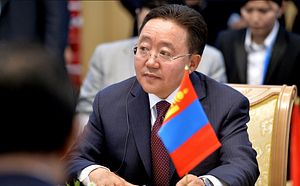As Mongolia celebrates Naadam, its annual summer holiday, it is also readying itself for the 11th Asia-Europe Meeting. According to organizers, presidents and prime ministers from 34 countries plan to attend the event in Ulaanbaatar, which will take place this week on July 15 and 16.
This year’s ASEM Summit marks the 20th anniversary of Asia-Europe Meeting, and its theme is “Partnership for the Future through Connectivity.” Over 3,000 international visitors are projected to travel to Mongolia for the Summit, with some estimates as high as 5,000. Mongolia is hosting nine side events leading up to the main show including the 8th Asia-Europe Foundation (ASEF) Editors Roundtable, the ASEM Consultative Meeting on Food Security, and the 15th Asia-Europe Business Forum.
President Park Geun-hye of South Korea, Premier Li Keqiang of China, and Japanese Prime Minister Shinzo Abe are just a few of the high-profile Asian leaders expected to attend. President of the European Council Donald Tusk and the president of the European Commission, Jean-Claude Juncker, will also make appearances this weekend in Mongolia’s capital.
With the Permanent Court of Arbitration in The Hague’s decision on Tuesday that China’s claims over much of the disputed South China Sea are groundless, and China’s consequent declaration of the court’s ruling as invalid, this week’s ASEM Summit is timely. Chinese Assistant Foreign Minister Kong Xuanyou has said publicly that discussion of the issue will not be welcome at the Summit.
Before the eagerly-anticipated convention on Friday, Mongolia will finish celebrating this year’s Naadam festival, held from July 10 to 13. The festivities consist of a number of national ceremonies, concerts, and, most notably, sporting competitions—including those for the “three manly sports” of wrestling, horseracing, and archery. Many other side events such as shegai, a game involving flicking sheep anklebones, and a variety of carnival games are also popular on the holiday.
During the annual festivities Mongolians traditionally consume khuushuur, fried meat pockets, and airag, fermented mare’s milk, in addition to a wide variety of dairy products. The Naadam games have been celebrated for centuries by the nation’s nomads and represent Mongolia’s living cultural legacy of nomadic pastoralism. Today, the festival is a major tourism draw which attracts thousands of foreigners each year to witness the spectacle.
The Mongolian government’s decision to hold two major international events in the same week is ambitious. In anticipation, President Tsakhiagiin Elbegdorj declared an unusually long public holiday, from the beginning of Naadam until after the ASEM Summit concludes, in order to encourage residents of the capital to travel to the countryside as the city welcomes delegations from dozens of nations.
The former Prime Minister Chimediin Saikhanbileg, who recently lost his premiership and parliamentary seat in a landslide victory for the Mongolian People’s Party, publicly urged residents to leave the city while it hosts the scores of international visitors.
While the government has recently changed following the Democratic Party’s rout in the national parliamentary elections at the end of June, the same leadership at the Ministry of Foreign Affairs remains in control of coordinating the events, which have been under preparation for many months.
A wide variety of road and airport infrastructure projects have been underway since it was announced in October of 2014 that Mongolia would host the bi-annual event, and a number of ASEF member nations have contributed to the preparations financially and through in-kind donations.
Most delegates will stay in the newly-constructed ASEM Village south of the capital with the official proceedings taking place at the Shangri-La Hotel in Ulaanbaatar. Multiple major road closings in the capital have been announced over the days of the ASEM Summit to make way for international delegates.
Some critics are skeptical that Mongolia will pull off the event without a hitch, especially as the nation already faces infrastructure challenges, and construction appeared incomplete on several urban projects in the days leading up the event.
Minister of Foreign Affairs, Lundeg Purevsuren, called ASEM a “big opportunity for Mongolia” to show that it can act as a hub between Asia and Europe and serve as a venue for future international events. “It will be a success,” said Purevesuren in his interview with The Diplomat.
The potential for ASEM to boost Mongolia’s international reputation is great but so is the possibility of logistical difficulties hampering that image, said foreign officials who preferred to be unnamed.
“ASEM represents for Mongolia an opportunity to broaden its inter-personal networks to an unusually wide range of ‘third neighbors’, many of whom share its democratic character,” said Dr. Kent Calder, director of the Reischauer Center for East Asian Studies at Johns Hopkins’ School of Advanced International Studies.
At ASEM11, the world will decide whether Mongolia makes the most of its chance.

































